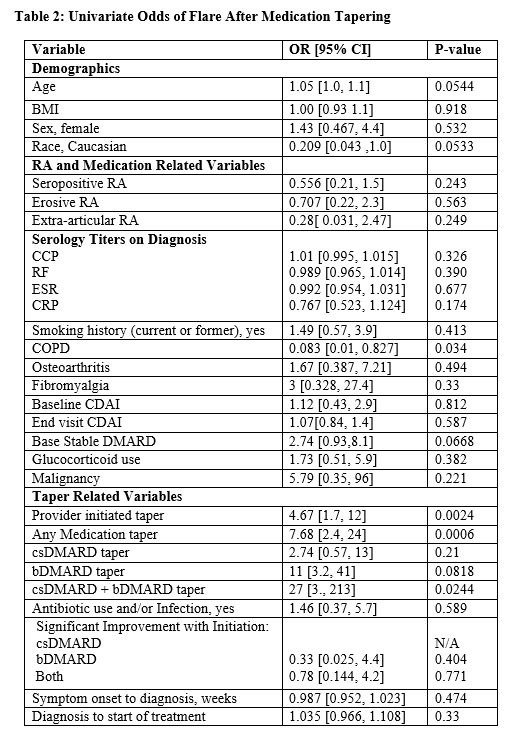Session Information
Date: Monday, November 14, 2022
Title: RA – Treatment Poster IV
Session Type: Poster Session D
Session Time: 1:00PM-3:00PM
Background/Purpose: Long term use of conventional synthetic DMARDs (csDMARDs) and biologics in RA has clinical risks including infection and malignancy. Few RCTs and real-world studies have systematically evaluated predictors of flares after medication tapering in RA. In this study, we attempted to identify predictors of RA flares after conventional synthetic DMARD (csDMARD) and/or biologic DMARD (bDMARD) tapering within the RHEUmatoid Arthritis MEdication TAPering (RHEUMTAP) cohort.
Methods: RHEUMTAP is a 2-year prospective cohort of patients with RA in sustained remission on bDMARDs with or without csDMARDs. Manual EHR review was performed to confirm RA diagnosis and sustained remission status. Primary aim of this analysis was to identify predictors of flare after tapering at the end of study period. Flare was defined as provider diagnosed worsening RA requiring initiation, change or increase in therapy. Statistical analyses were completed using SAS Enterprise Guide 7.15 HF3 (SAS Institute, Inc, Cary, NC). Univariate and multivariable logistic regression analyses were used to estimate adjusted odds of flare.
Results: The RHEUMTAP cohort included 346 patients of which 131 patients were confirmed to have sustained remission on bDMARDs with or without csDMARDs. Of these 131 patients, 51 patients underwent a medication taper. Flare was experienced by 20 (15%) patients, of which 15 were in the taper groups and 5 in the no-taper group. Patient undergoing any medication taper overall was 7.6 times more likely to experience a flare compared to those not tapered (OR 7.68, 95% CI 2.4-24, p=0.0006). Tapering both biologic and csDMARDs was more likely to experience a flare (OR 27, 95% CI 3.0-213, p< 0.0244). In univariate analysis, provider-initiated tapers were more likely to flare (OR 4.67, CI 1.7-12, p 0.0024), and there was an observed although non-significant increased risk of flare with age, non-caucasian race, high CCP antibody titers on initial diagnosis, baseline csDMARD use which were not significant in our analysis.
Conclusion: RHEUMTAP is a real-world prospective cohort study reporting on predictors of flare after tapering medication in patients with RA in sustained remission. In our cohort, patients that tapered both bDMARDs and csDMARDs, and tapers that were initiated by providers were more likely to experience a flare. Tapering only csDMARD was not found to significantly increase odds of flare. Future studies are warranted to explore csDMARD tapering strategies in patients interested in reducing their medications while on background therapy.
To cite this abstract in AMA style:
Alrifai N, Tageldin M, Attur M, Wilson N, schorr R, Sharma T. Predictors of Flare in the RHEUmatoid Arthritis Medication TAPering (RHEUMTAP) Cohort [abstract]. Arthritis Rheumatol. 2022; 74 (suppl 9). https://acrabstracts.org/abstract/predictors-of-flare-in-the-rheumatoid-arthritis-medication-tapering-rheumtap-cohort/. Accessed .« Back to ACR Convergence 2022
ACR Meeting Abstracts - https://acrabstracts.org/abstract/predictors-of-flare-in-the-rheumatoid-arthritis-medication-tapering-rheumtap-cohort/


